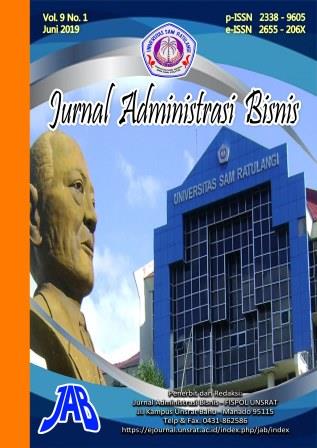Analisis Profitabilitas Pada PT Bank Negara Indonesia Tbk Cabang Manado
DOI:
https://doi.org/10.35797/jab.v9.i1.43-48Keywords:
Financial Report, Profitability RatioAbstract
The purpose of this research is to analyze the financial ratios in particular the profitability ratio of PT Bank Negara Indonesia Tbk. In the present era more and more companies are emerging and also the competition is so strict, therefore the company must Increase the profit that can be able to compete. The research method used is the ratio of profitability. The profitability ratio is a ratio used to measure the company's ability to generate profit at a certain level of sales, Aser, and stock Capital The research results show that profitability can be said to be good when Profit that can be held annually in the company is able to achieve the target of the company itself. And the results obtained from the research of each indicator for five years from year 2014-2018 is as follows. Gross Profit Margin in the year 2014 of 59%, 2015 of 45%, 2016 amounted to 48%, 2017 for 54%, and 2018 for 56%. Operating Profit Margin in the year 2014 of 59%, 2015 of 45%, 2016 amounted to 48%, 2017 for 54%, and 2018 for 55%. Net Profit Margin in the year 2014 of 48%, 2015 of 36%, 2016 amounted to 38%, 2017 for 43%, and 2018 for 42%. Return on Assets in 2014 amounted to 3%, 2015 by 2%, 2016 by 2%, 2017 by 2%, and 2018 by 2%. Return on Equity in 2014 amounted to 18%, 2015 by 12%, 2016 by 13%, 2017 by 14%, and 2018 by 14%. It can be seen from the presentation of the five indicators can be said to be good, although the presentation that can be in the company in 2015 was decreased, but the company was able to increase back in the following years. It means the company is able to minimize the profit gained according to expectations.References
Astrinika L. Agustin, Darminto, dan Siti R. Handayani. 2013. Analisis Rasio Keuangan Untuk menilai kinerja keuangan perusahaan. Jurnal Administrasi Bisnis (JAB). Vol 2 No1
Kasmir. 2015. Analisis Laporan Keuangan. Jakarta. PT Raja Grafindo Persada
Jumingan. 2014. Analisis Laporan Keuangan. Jakarta, PT Bumi Aksara
Kasmir. 2014. Dasar-dasar Perbankan. Depok, PT Raja Grafindo Persada
Hijriyani, Nur Zulfah, Setiawan. 2017. Analisis Profitabilitas Perbankan Syariah di Indonesia Sebagai Dampak dari Efisiensi Operasional. Jurnal Kajian Akuntansi. Vol 1, No 2
Irham Fahmi. 2014. Analisis Kinerja Keuangan Panduan bagi akademisis, Manajer, dan Investor Untuk Menilai dan Menganalisis Bisnis dari Aspek Keuangan. Bandung, Alfabeta, CV
Nurbaiti, Farida Lena. 2016. Analisis Rasio Profitabilitas untuk Mengukur Kinerja Keuangan Pada Bank BUMN Yang Terdaftar di Bursa Efek Indonesia Periode 2010-2014. Jurnal Online Mahasiswa (JOM) Bidang Ilmu Sosial dan Ilmu Politik. Vol 3, No 2
Sofyan S. Harahap. 2016. Analisis Kritis Terhadap Laporan Keuangan. Jakarta, PT RajaGrafindo Persada
Yusa, Feby Febrianti, Ruzikna. 2016. Analisis Rasio Likuiditas dan Rasio Profitabilitas dalam Rangka Meningkatkan Kinerja Keuangan (kasus pada perusaaan kosmetik dan barang keperluan rumah tangga yang terdaftar di Bursa Efek Indonesia). Jurnal Online Mahasiswa (JOM) Bidang Ilmu Sosial dan Ilmu Politik. Vol 3, No 2



